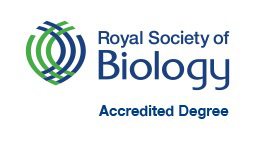Zoology Code C300 Attend an Open Day Attend an Open Day
Apply NowKey Facts
C300-
UCAS Tariff
120 - 104
-
Course duration
3 years
Available for September start 2025
Further details on entry requirements
Apply NowZoologists apply their scientific skills to understand animal life in all its diversity and complexity, and at all scales, from cells, to organisms, to ecosystems. On the BSc Zoology degree at Aberystwyth University you'll also develop a solid foundation of transferable scientific skills, as evidenced by our Royal Society of Biology accreditation.
Equipped with these skills, youll develop your expertise in vertebrate and invertebrate zoology, and will choose from a wide range of specialist modules in areas including animal behaviour, marine and freshwater biology, parasitology and wildlife conservation. You'll develop advanced skills in zoology research and ultimately conduct your own independent zoology research project.
You’ll do all this within the wild and beautiful setting of West Wales, which is home to bottlenose dolphins, Atlantic grey seals, pine martens, otters, ospreys and red kites. In addition, you’ll have the opportunity to study zoology on residential field courses further afield, including the hyperdiverse tropical rainforest.
Course Overview
Modules September start - 2025
Please note: The modules listed below are those currently intended for delivery during the next academic year and may be subject to change. They are included here to give an indication of how the course is structured.
| Module Name | Module Code | Credit Value |
|---|---|---|
| Cell Biology * | BR17520 | 20 |
| Comparative Animal Physiology | BR16720 | 20 |
| Ecology and Conservation * | BR19320 | 20 |
| Genetics, Evolution and Diversity | BR17120 | 20 |
| Microbial and Plant Diversity * | BR19920 | 20 |
| Skills for Wildlife Scientists * | BR15720 | 20 |
| Module Name | Module Code | Credit Value |
|---|---|---|
| Invertebrate Zoology | BR25420 | 20 |
| Research Methods * | BR27520 | 20 |
| Vertebrate Zoology | BR26820 | 20 |
Options
| Module Name | Module Code | Credit Value |
|---|---|---|
| Animal Behaviour | BR21620 | 20 |
| Evolution and Molecular Systematics | BR21720 | 20 |
| Freshwater Biology | BR22020 | 20 |
| Marine Biology | BR22620 | 20 |
| Researching Behavioural Ecology | BR27320 | 20 |
| Tropical Zoology Field Course | BR23820 | 20 |
| Veterinary Health | BR27120 | 20 |
| Wildlife Surveying | BR29620 | 20 |
| Module Name | Module Code | Credit Value |
|---|---|---|
| Research Project * | BR36440 | 40 |
Options
| Module Name | Module Code | Credit Value |
|---|---|---|
| Animal Behaviour Field Course | BR34920 | 20 |
| Behaviour and Welfare of Domesticated Animals | BR35120 | 20 |
| Behavioural Neurobiology | BR35320 | 20 |
| Freshwater Biology Field Course | BR37720 | 20 |
| Global Biodiversity Conservation | BR33420 | 20 |
| Marine Biology Field Course | BR30020 | 20 |
| Parasitology | BR33820 | 20 |
| Population and Community Ecology | BR33920 | 20 |
| Primatology | BR38820 | 20 |
| Wildlife Conservation | BR34520 | 20 |
* Also available partially or entirely through the medium of Welsh
Careers
Teaching & Learning
Student Testimonials
Typical Entry Requirements
UCAS Tariff 120 - 104
A Levels BBB - BCC with B in Biology
GCSE requirements (minimum grade C/4):
English or Welsh, Science and Mathematics
BTEC National Diploma:
DDD-DDM in a specified subject
International Baccalaureate:
30-28 with 5 points in Biology at Higher Level
European Baccalaureate:
75%-65% overall with 7 in Biology
English Language Requirements:
See our Undergraduate English Language Requirements for this course. Pre-sessional English Programmes are also available for students who do not meet our English Language Requirements.
Country Specific Entry Requirements:
International students whose qualification is not listed on this page, can check our Country Specific Entry Requirements for further information.
The University welcomes undergraduate applications from students studying the Access to Higher Education Diploma or T-level qualifications, provided that relevant subject content and learning outcomes are met. We are not able to accept Access to Higher Education Diplomas or T-levels as a general qualification for every undergraduate degree course.
Our inclusive admissions policy values breadth as well as depth of study. Applicants are selected on their own individual merits and offers can vary. If you would like to check the eligibility of your qualifications before submitting an application, please contact the Undergraduate Admissions Office for advice and guidance.

